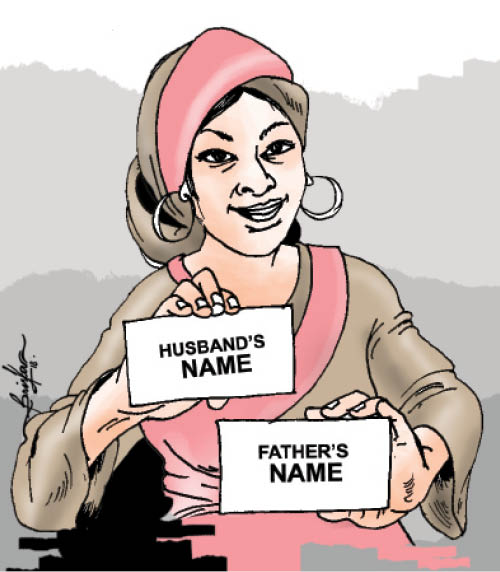For years, women have been taking their husband’s surnames upon marriage and it’s become a cultural convention in Nigeria. Although it may not be a modern-day legal requirement, many women still choose to change their names.
In Nigeria it is legal to call yourself whatever you want – as long as you have a copy of the change of name publication on any daily newspaper. For many, their reasoning lies in belief that it’s the “traditional” thing to do once you get married, while others believe that the act is an “outdated tradition” with sexist connotations.
Basira Yusuf nee Abdullahi, an entrepreneur said there is prestige that comes with adopting the spouses name after marriage.
“In the North, after a certain age and you are not married, people begin to look at you a certain way. They begin to address you in a disrespectful manner. So adopting your husband’s name after marriage validates that you are married and nobody would contest that,” she said.
She recalled that before she got married, their neighbours hardly responded to her greetings without snide comments but after the marriage, the same people that were not responding to her greetings were now the ones that would call her several times a day to say hello when they meet.
“I got so much respect and even though my husband wouldn’t mind me sticking with my maiden name, I am glad I changed it” she said.
Oyinlola Mustapha Lawal, a journalist in Abuja believes that there shouldn’t be any compulsion for a woman to change her name after marriage adding that working women who have forged a thriving career while using their maiden name may also want to maintain their professional identity.
“Most husbands believe that the minute after marriage, it is expected that you begin thinking about changing your name. I think it represents a woman being handed over like a product from her father to her husband. Some might choose to view wives that keep their names as feminists.”
“Besides, my career provides a valid rationale for keeping my name. We never discussed the issue with my husband before marriage so you can understand my frustration the week after marriage when he dropped N5000 demanding that I change my name” she said.
“I told him I would never change my name. I love my surname and I wouldn’t want to change my byline for anything. I need it to be consistent. And that became our first fight after marriage. Well, to let peace reign, I added Lawal to my name.”
Ramatu Raji said she could have retained her name if she wanted to feel completely married and not have the name drag her back to her maiden roots.
“I am married now I should enjoy it fully and not confuse people whether or not I am married. Some women decide to double-barrel the maiden and spousal names to form a new name and that would have been what I would have done but I think adopting my husband’s name is fine as I have done” she said.
Jatau Audu, a teacher in Kaduna believes a lady shouldn’t be compelled to change her name noting that it should be her choice.
“Some worry if the marriage crumbles, they will be forced to change back the name and it becomes series of court affidavits, newspaper publications and other stressful activities.”
“I was married once and before we decided to part ways, I ensured that my wife changed her name, she didn’t like it but she did anyways. 8 years later, we decided to get divorced and I saw how she had to go through the stress of changing her name back to the maiden name, I felt sorry for her maybe because I still felt guilty for the broken marriage, but I feel it’s so much stress anyways”.
Martha James believes that the custom of taking one’s husband’s name after marriage is slowly fading.
She thinks women are opting to keep their maiden names after marriage and those that choose to adopt the married names do so because the society and culture wrongfully values women based on their relationships with men.
Why do women adopt their spouse’s names?

 Join Daily Trust WhatsApp Community For Quick Access To News and Happenings Around You.
Join Daily Trust WhatsApp Community For Quick Access To News and Happenings Around You.


